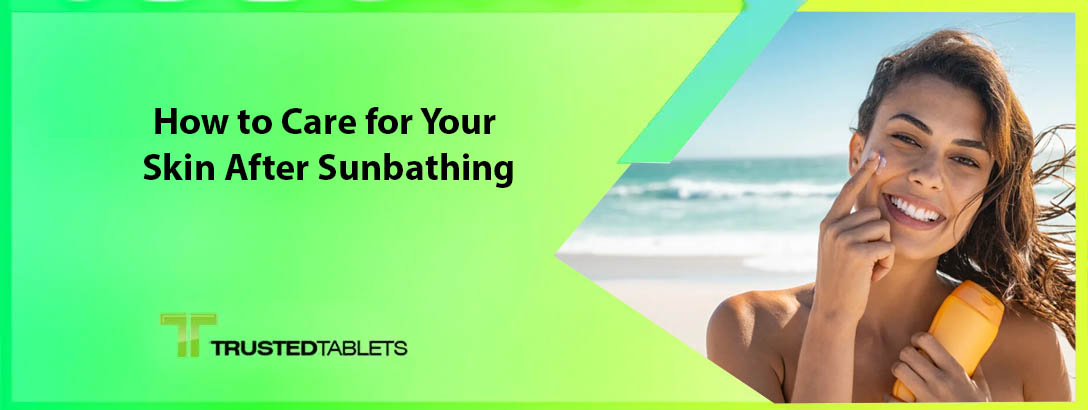After enjoying some time in the sun, it’s crucial to care for your skin properly to prevent damage and maintain its health. Here’s a comprehensive guide on how to care for your skin after sunbathing:
Hydrate Your Skin
Sun exposure can dehydrate your skin, so it’s essential to replenish moisture. Opt for a hydrating moisturizer or aloe vera gel to soothe and hydrate your skin after sunbathing.
Cool Down
If your skin feels warm or irritated, take a cool shower or bath. This helps cool your skin and reduce inflammation caused by sun exposure.
Apply Aloe Vera
Aloe vera is known for its soothing properties and can help relieve sunburned skin. Apply a generous amount of pure aloe vera gel to affected areas to calm inflammation and promote healing.
Avoid Harsh Products
After sun exposure, avoid using harsh products such as exfoliants or products containing alcohol, as they can further irritate sunburned skin. Stick to gentle, hydrating products instead.
Wear Loose, Comfortable Clothing
Opt for loose, breathable clothing to avoid further irritation to sun-exposed skin. Cotton or linen fabrics are ideal choices to allow your skin to breathe and recover.
Drink Plenty of Water
Hydrate from the inside out by drinking plenty of water after sunbathing. This helps replenish lost fluids and supports overall skin health.
Use a Mild Cleanser
When washing your skin after sunbathing, use a mild, gentle cleanser. Avoid hot water, as it can further dry out your skin. Lukewarm water is best for cleansing sun-exposed skin.
Moisturize Regularly
Keep your skin hydrated by applying a moisturizer regularly, especially in the days following sun exposure. Look for moisturizers that contain ingredients like hyaluronic acid or ceramides to lock in moisture.
Protect Your Skin
Even after sunbathing, continue to protect your skin from UV rays. Apply a broad-spectrum sunscreen with SPF 30 or higher whenever you’re outdoors, and reapply as directed.
Monitor Your Skin
Keep an eye on your skin for any signs of sun damage, such as redness, peeling, or blisters. If you notice any concerning symptoms, consult a dermatologist for appropriate treatment.
Summary Table
| Step | Description |
|---|---|
| Hydrate Your Skin | Apply a hydrating moisturizer or aloe vera gel to replenish moisture. |
| Cool Down | Take a cool shower or bath to reduce skin temperature and inflammation. |
| Apply Aloe Vera | Use pure aloe vera gel to soothe sunburned skin and promote healing. |
| Avoid Harsh Products | Steer clear of exfoliants or alcohol-based products that can irritate skin. |
| Wear Loose Clothing | Opt for breathable fabrics like cotton to prevent further skin irritation. |
| Drink Plenty of Water | Hydrate your body to support skin recovery and overall health. |
| Use a Mild Cleanser | Cleanse gently with a mild cleanser and lukewarm water to avoid drying out. |
| Moisturize Regularly | Apply moisturizer with ingredients like hyaluronic acid to lock in moisture. |
| Protect Your Skin | Continue to use sunscreen to shield skin from UV rays even after sunbathing. |
| Monitor Your Skin | Watch for signs of sun damage and seek medical advice if needed. |
FAQ
How long does it take for sunburned skin to heal?
The healing time for sunburned skin depends on its severity. Mild sunburns may heal within a few days to a week, while more severe sunburns can take up to two weeks or longer.
Can I apply makeup to sunburned skin?
It’s best to avoid applying makeup to sunburned skin, as it can further irritate the skin and hinder the healing process. Allow your skin to heal fully before using cosmetics.
Should I use ice packs on sunburned skin?
Ice packs can help cool down sunburned skin and reduce inflammation. However, wrap the ice pack in a cloth to prevent direct contact with the skin, which can cause frostbite.
Is it safe to pop blisters caused by sunburn?
No, it’s important not to pop blisters caused by sunburn, as this can increase the risk of infection. Allow blisters to heal naturally and protect them with a non-stick dressing if needed.
How can I soothe itching from sunburn?
To relieve itching from sunburn, apply a cool compress to affected areas or take an oatmeal bath. Avoid scratching, as this can further irritate the skin.
Can sunburn cause long-term skin damage?
Yes, repeated sunburns can lead to long-term skin damage, including premature aging and an increased risk of skin cancer. Protect your skin from sun exposure to minimize these risks.
When should I see a doctor for sunburn?
Consult a doctor if you experience severe blistering, fever, chills, or signs of infection such as pus or increased pain. These symptoms may indicate a more serious sunburn requiring medical attention.


